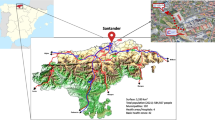Abstract
The Study of Health in Pomerania (SHIP) is a population-based cohort study in the north-east of Germany, consisting of two independent cohorts, SHIP and SHIP-TREND (Volzke et al. 2011). Adults, selected from local population registries, aged 20–79, with their primary place of residence in the counties of Nordvorpommern and Ostvorpommern and the two cities of Greifswald and Stralsund, were eligible for participation. Baseline examinations of the first cohort were performed between 1997 and 2001 (SHIP-0) and follow-up examinations between 2002 and 2006 (SHIP-1), 2008–2012 (SHIP-2), and 2014–2016 (SHIP-3). A second cohort (SHIP-Trend) was conducted from 2008 until 2012; the first follow-up (SHIP-Trend 1) has started in March 2016.
Access this chapter
Tax calculation will be finalised at checkout
Purchases are for personal use only
Similar content being viewed by others
References
Appelbaum PS, Lidz CW, Grisso T (2004) Therapeutic misconception in clinical research: frequency and risk factors. IRB 26(2):1–8
Busija L, Pausenberger E, Haines TP, Haymes S, Buchbinder R, Osborne RH (2011) Adult measures of general health and health-related quality of life: Medical Outcomes Study Short Form 36-Item (SF-36) and Short Form 12-Item (SF-12) Health Surveys, Nottingham Health Profile (NHP), Sickness Impact Profile (SIP), Medical Outcomes Study Short Form 6D (SF-6D), Health Utilities Index Mark 3 (HUI3), Quality of Well-Being Scale (QWB), and Assessment of Quality of Life (AQoL). Arthritis Care Res 63(Suppl 11):S383–S412. doi:10.1002/acr20541
Erdmann P, Langanke M, Assel H (2011) Incidental findings – understanding of risks by research subjects and implications for research ethics. In: Collste G, Manzeschke A (ed) Proceedings from the Societas Ethica Annual Conference 2011, The Quest for perfection. The future of Medicine/Medicine of the future, Universita della Svizzera Italiana. Lugano/Linköping: Linköpiing University Electronic Press, p 26
Hegenscheid K, Kuhn JP, Volzke H, Biffar R, Hosten N, Puls R (2009) Whole-body magnetic resonance imaging of healthy volunteers: pilot study results from the population-based SHIP study. RoFo 181(8):748–759
Hegenscheid K, Seipel R, Schmidt CO, Volzke H, Kuhn JP, Biffar R et al (2013) Potentially relevant incidental findings on research whole-body MRI in the general adult population: frequencies and management. Eur Radiol 23(3):816–826. doi:10.1007/s00330-012-2636-6
Kirschen MP, Jaworska A, Illes J (2006) Subjects’ expectations in neuroimaging research. J Magn Reson Imaging 23(2):205–209. doi:10.1002/jmri.20499
Langanke M, Brothers KB, Erdmann P, Weinert J, Krafczyk-Korth J, Dorr M et al (2011) Comparing different scientific approaches to personalized medicine: research ethics and privacy protection. Pers Med 8(4):437–444
Martin A, Rief W, Klaiberg A, Braehler E (2006) Validity of the brief patient health questionnaire mood scale (PHQ-9) in the general population. Gen Hosp Psychiatry 28(1):71–77
Royal JM, Peterson BS (2008) The risks and benefits of searching for incidental findings in MRI research scans. J Law Med Ethics 36(2):305–314, 212
Schmidt CO, Hegenscheid K, Erdmann P, Kohlmann T, Langanke M, Volzke H et al (2013) Psychosocial consequences and severity of disclosed incidental findings from whole-body MRI in a general population study. Eur Radiol 23(5):1343–1351. doi:10.1007/s00330-012-2723-8
Schmidt CO, Sierocinski E, Hegenscheid K, Baumeister SE, Grabe HJ, Volzke H (2016) Impact of whole-body MRI in a general population study. Eur J Epidemiol 31(1):31–39. doi:10.1007/s10654-015-0101-y
Shoemaker JM, Holdsworth MT, Aine C, Calhoun VD, de La Garza R, Feldstein Ewing SW et al (2011) A practical approach to incidental findings in neuroimaging research. Neurology 77(24):2123–2127. WNL.0b013e31823d7687 [pii]
Viberg J, Hansson MG, Langenskiold S, Segerdahl P (2014) Incidental findings: the time is not yet ripe for a policy for biobanks. Eur J Hum Genet 22(4):437–441. doi:10.1038/ejhg.2013.217
Volzke H, Alte D, Schmidt CO, Radke D, Lorbeer R, Friedrich N et al (2011) Cohort profile: the study of health in Pomerania. Int J Epidemiol 40(2):294–307. doi:10.1093/ije/dyp394
Volzke H, Schmidt CO, Hegenscheid K, Kuhn JP, Bamberg F, Lieb W et al (2012) Population imaging as valuable tool for personalized medicine. Clin Pharmacol Ther. doi:10.1038/clpt.2012.100
Wolf SM, Lawrenz FP, Nelson CA, Kahn JP, Cho MK, Clayton EW et al (2008) Managing incidental findings in human subjects research: analysis and recommendations. J Law Med Ethics 36(2):219–248. doi:10.1111/j.1748-720X.2008.00266.x, 1
Acknowledgments
SHIP is part of the Community Medicine Research net of the University of Greifswald, Germany, which is funded by the Federal Ministry of Education and Research (grant No. 03ZIK012), the Ministry of Cultural Affairs, as well as the Social Ministry of the Federal State of Mecklenburg-West Pomerania. Whole-body MR imaging was supported by a joint grant from Siemens Healthcare, Erlangen, Germany, and the Federal State of Mecklenburg-Vorpommern. The University of Greifswald was a member of the “Center of Knowledge Interchange” program of the Siemens AG. Dynamic contrast-enhanced MR mammography research is part of the entire whole-body MRI study and was supported by Bayer Healthcare. The work was further supported by the DFG (grant No. SCHM 2744/1-1).
Author information
Authors and Affiliations
Corresponding author
Editor information
Editors and Affiliations
Rights and permissions
Copyright information
© 2016 Springer International Publishing Switzerland
About this chapter
Cite this chapter
Schmidt, CO., Hegenscheid, K. (2016). Management of Incidental Findings in the Study of Health in Pomerania. In: Weckbach, S. (eds) Incidental Radiological Findings. Medical Radiology(). Springer, Cham. https://doi.org/10.1007/174_2016_86
Download citation
DOI: https://doi.org/10.1007/174_2016_86
Published:
Publisher Name: Springer, Cham
Print ISBN: 978-3-319-42579-5
Online ISBN: 978-3-319-42581-8
eBook Packages: MedicineMedicine (R0)




